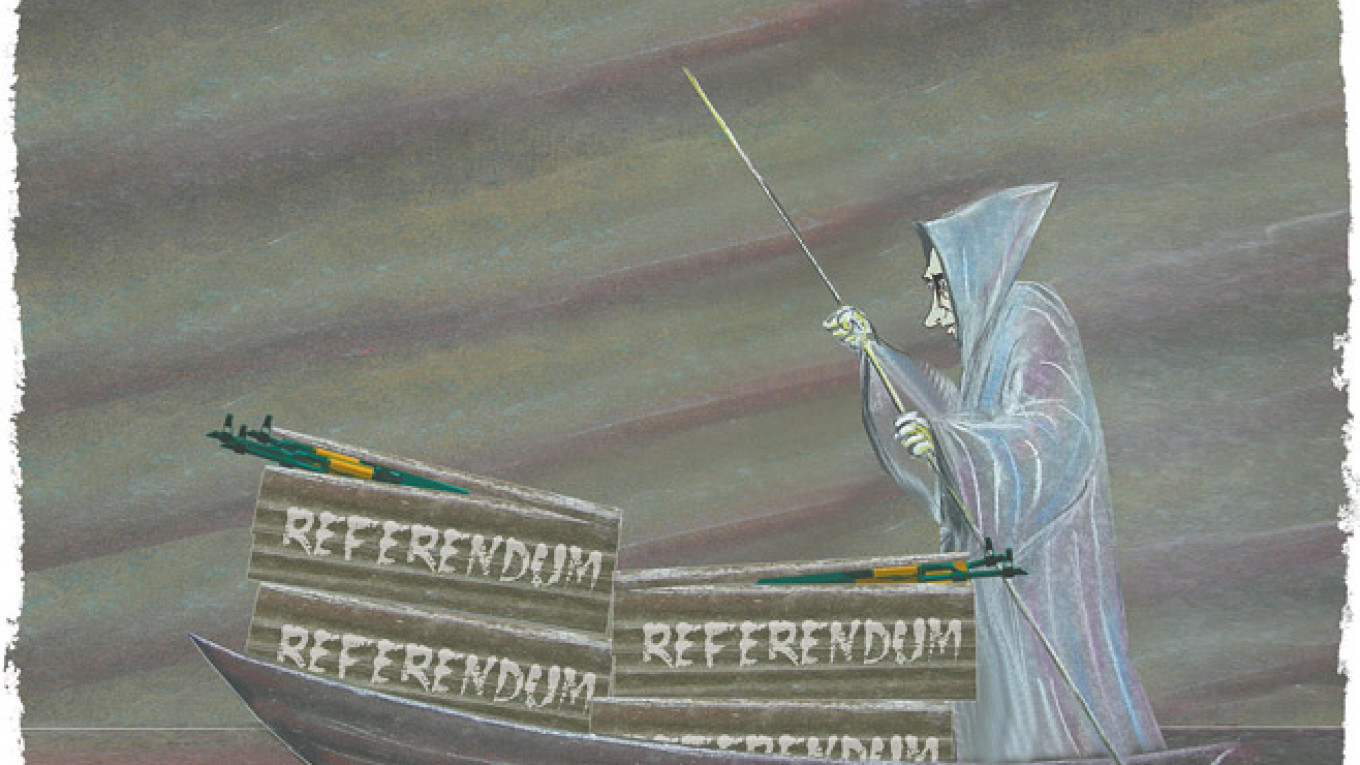President Vladimir Putin is doing everything he can to avoid war in Ukraine, while Kiev is expanding its military operations in eastern and southern Ukraine.
Washington not only refuses to listen to Moscow's position, but threatens even tougher measures against Russia. Western leaders have only fanned the flames of this anti-Russian hysteria by blaming everything on Russia.
There is a growing public opinion backlash in a number of EU countries against Washington’s extremist politics. Hopefully, more European politicians will listen to their constituencies and adopt a more balanced policy.
But why is Putin still reluctant to send peacekeeping troops to eastern and southern Ukraine? And why did he remain silent for the past two weeks, only to break that silence by speaking of a peaceful resolution to the crisis?
Putin is biding his time, hoping that both sides, with the help of mediators from the U.S., Russia and European Union, can resolve the crisis without military intervention. Former Prime Minister Yulia Tymoshenko has already announced that a third revolution will take place if her opponent, Petro Poroshenko, wins the presidential election on May 25, raising the real possibility that the junta in Kiev might collapse from internal conflicts.
Meanwhile, Ukraine's rapidly worsening social, economic and political problems resulting from the lack of effective government could lead to massive strikes that would paralyze the economy. The junta's flagrant acts of violence could turn Ukrainians against it and finally break the West's information blockade on reporting their crimes.
EU support for Washington's pro-Kiev policy allows Ukraine's interim government to continue its policy of violence against pro-Russian protesters. But there is a growing public opinion backlash in a number of EU countries against Washington's extremist politics. Hope remains that more European politicians will listen to their constituencies and require the EU to adopt a more balanced policy.
The anti-U.S. mood might influence the outcome of the European Parliament elections on May 25. European extreme right parties, such as France's National Front and the Freedom Party of Austria, have been increasingly critical of Washington and sympathetic toward Russia. This political trend could force the EU to pay more attention to the arguments of Russia and Russian speakers in the Donbass.
Putin is waiting and hoping that the truth concerning the crimes and injustices perpetrated by the junta in Kiev will eventually reach Europeans, who will speak out with their own voice instead of simply echoing Washington's line.
Putin is trying to buy time, but his basic peace plan for Ukraine remains unchanged. He wants Kiev to end its military campaign against its own citizens, withdraw the Army to its bases, disarm the neo-?fascist gangs that have been legalized under the guise of the National Guard and to amend the Constitution to put the Russian language on equal footing with Ukrainian as a means for ending discrimination against Ukraine's Russian-speaking citizens, who constitute 65 percent of the population, not counting Crimea. Moscow is also demanding the transition to a federation model — one that is based on the U.S. or Germany to protect against discrimination by the ?ultra-nationalist government in Kiev. The Kremlin is also insisting on constitutional guarantees that Kiev will keep its nonbloc status, which would eliminate the possibility of NATO membership.
Under a new federation model, the Donetsk and Luhansk republics would sign treaties with Kiev to become autonomous republics within Ukraine. If Kiev refuses to give protections for Russian speakers, the new republics will likely continue their battles for greater autonomy and distance themselves even further from Kiev.
One possibility is the formation of a new state called "New Russia" that would include all of the eastern and southern Ukrainian regions in which ethnic Russians and Russian-speaking people constitute a solid majority. New Russia is the historical name that arose after the region became part of the Russian Empire under Catherine the Great. There are more than 20 million people living in New Russia, which would make for a mid-sized European country.
New Russia might also become part of Russia, but only as an extreme measure? — if Moscow has no other way to ensure that the region's Russian speakers do not fall victim to the ultra-nationalists? — those who spilled Russian blood in Odessa and have not been held accountable for their crimes.
But I am afraid that Putin's peaceful plan has little chance of succeeding. In all likelihood, the conflict will worsen. But instead of sending troops to Ukraine, Russia might give the green light to the thousands of volunteers in Russia and abroad who are eager to come to Ukraine and join the struggle against U.S. domination. Putin's leadership and strength shown in Crimea and Donbass has served as a powerful beacon to mobilize people all over the world to oppose U.S. meddling in Russia's backyard and U.S. attempts to expand its hegemony all over the world.
Sergei Markov is director of the Institute of Political Studies.
A Message from The Moscow Times:
Dear readers,
We are facing unprecedented challenges. Russia's Prosecutor General's Office has designated The Moscow Times as an "undesirable" organization, criminalizing our work and putting our staff at risk of prosecution. This follows our earlier unjust labeling as a "foreign agent."
These actions are direct attempts to silence independent journalism in Russia. The authorities claim our work "discredits the decisions of the Russian leadership." We see things differently: we strive to provide accurate, unbiased reporting on Russia.
We, the journalists of The Moscow Times, refuse to be silenced. But to continue our work, we need your help.
Your support, no matter how small, makes a world of difference. If you can, please support us monthly starting from just $2. It's quick to set up, and every contribution makes a significant impact.
By supporting The Moscow Times, you're defending open, independent journalism in the face of repression. Thank you for standing with us.
Remind me later.


